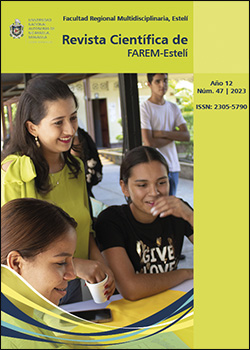Strengthening the productive vocation from the national distance secondary school program in the countryside. Community of Isiquí, Estelí, Nicaragua
DOI:
https://doi.org/10.5377/farem.v12i47.16860Keywords:
Rural education, rural employment, community development, rural identity, rural youthAbstract
In the year 2022, the National Program of Productive Vocation for Work and Life was opened, aimed at students of Secondary Distance Education in the Rural Areas (SDERA), through specialized courses with topics related to the use of agroecological diversity in the community, the production of basic grains and vegetable crops, as well as the breeding and reproductive management of large and small animals. The objective of this study was to analyze the contributions that the Productive Vocation Program provides to the construction of knowledge on agricultural technologies, which promote innovation and entrepreneurship as a contribution to the improvement of agricultural production and, therefore, to the living conditions of families and the development of rural communities in Nicaragua. A qualitative research approach was used to analyze the experiences and evaluations of students, teachers and facilitators who participated in the Productive Vocation Program, together with a bibliographic review on the subject. The study was carried out at the Secondary School in the Isiquí community in the municipality of Estelí. For the collection of information, techniques such as observation, interview and content analysis were applied. The National Program of Productive Vocation contributes knowledge and skills in the students of the Secondary Distance Education in the Rural Areas (SDERA), in agricultural production, allowing them to identify the activities in the rural areas as options for obtaining income that contribute to the family economy, community development, food and nutritional security, community roots and the conservation of cultural identity; likewise, this program contributes to the students in a way that provides them with the tools to propose possible solutions to problems that they identify in their daily lives.
Downloads
References
BCN [Banco Central de Nicaragua]. (2021). Nicaragua en cifras. https://www.bcn.gob.ni/sites/default/files/documentos/Nicaragua%20en%20cifras%202021.pdf
Chávez, M., Alcoba, L., Quiroga, M., (01 de diciembre de 2022). Desafíos para el arraigo rural. Instituto Nacional de Tecnología Agropecuaria. https://inta.gob.ar/documentos/desafios-para-el-arraigo-rural
OIT [Organización Internacional del Trabajo]. (14 de febrero de 2014). La agricultura y el empleo juvenil: El eslabón perdido. https://www.ilo.org/global/about-the-ilo/mission-and-objectives/features/WCMS_235659/lang--es/index.htm
Estermann, J. 1998. Filosofía andina: estudio intercultural de la sabiduría autóctona andina. Quito, Ecuador: Ediciones Abya-Yala. https://www.academia.edu/36493848/Estermann_Josef_Filosofia_andina
FAO [Organización de las Naciones Unidas para la alimentación y la agricultura]. (2014). Los jóvenes y la agricultura: Desafíos y selecciones concretas. https://www.fao.org/3/i3947s/I3947S.pdf
Gliessman, S. (2002). Agroecología: Procesos ecológicos en agricultura sostenible. CATIE
Gobierno de Reconciliación y Unidad Nacional [GRUN]. (2021). Plan Nacional de lucha contra la pobreza y para el desarrollo humano 2022 - 2026. https://www.pndh.gob.ni/index.shtml
Huerta, E., Maradiaga, M., Ríos, R. (2021). Secundaria a Distancia en el Campo: en el Campo: un espacio para crecer en el un espacio para crecer en el bien común desde la comunidad bien común desde la comunidad y para la comunidad y para la comunidad. Revista de educación de Nicaragua INDICE, 1(2), 17 – 25. http://revistaindice.cnu.edu.ni/index.php/indice/article/view/38/47
Loyola, J. (2016). Conocimientos y prácticas ancestrales y tradicionales fortalecen la sustentabilidad de los sistemas hortícolas de la parroquia de San Joaquín. LA GRANJA. Revista de Ciencias de la Vida, vol. 24, núm. 2, pp. 29-42, 2016. https://www.redalyc.org/journal/4760/476051632002/html/
Lucks, D. (2020, 1 de abril). Los jóvenes y la agricultura: ¿qué podemos aprender de las evaluaciones? [Mensaje en un blog]. EvalForward. https://www.evalforward.org/es/blog/youth-agriculture
Martínez-López, A., Cruz-León, A., Sangerman-Jarquín, D., Díaz, S., Cervante, J., Ramírez-Valverde, B. (2019). El estudio de los saberes agrícolas como alternativa para el desarrollo de las comunidades cafetaleras, 10 (7), 1615 – 1626. https://www.scielo.org.mx/pdf/remexca/v10n7/2007-0934-remexca-10-07-1615.pdf
Páez. O. (2001). Revaloricemos la educación rural. Revista Candidus No.16. http://www.quadernsdigitals.net/datos_web/articles/candidus/candidus8/revaloricemos.htm
World Organization of Animal Health [WOAH]. Código Sanitario para los animales terrestres. (2008), artículo 7.1.1. https://www.woah.org/fileadmin/Home/esp/Health_standards/tahc/current/es_chapitre_aw_introduction.htm
Published
Issue
Section
License
Copyright (c) 2023 Revista Científica de FAREM-Esteli

This work is licensed under a Creative Commons Attribution-NonCommercial-ShareAlike 4.0 International License.



